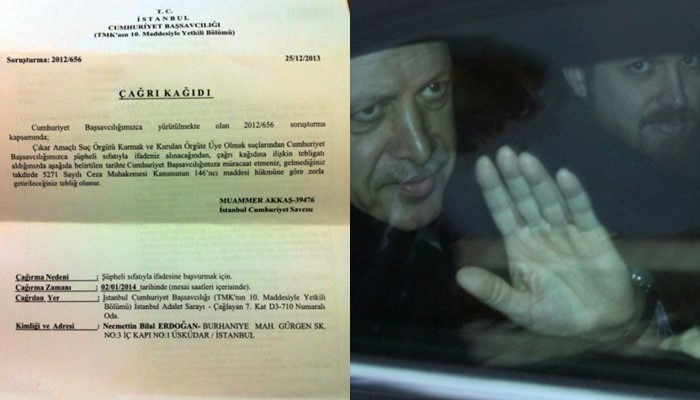İbrahim Okur, former head of the First Chamber of Turkey’s Supreme Board of Judges and Prosecutors (HSYK), said then-Turkish Prime Minister Recep Tayyip Erdoğan called and asked him to stop prosecutors from going after his son Bilal Erdoğan during a corruption operation in December 2013, the Cumhuriyet daily reported.
“Mr. Prime Minister [Erdoğan] told me [on the phone] that Zekeriya Öz [then-Istanbul deputy chief prosecutor] does unlawful things. According to information they obtained, [Öz] was going to order an operation on Kısıklı [Erdoğan’s house] to get Bilal Erdoğan. He sought my help to get these unlawful actions stopped,” said Okur, who has been in pretrial detention for more than two years on charges of membership in the Gülen movement, during a hearing at the Court of Cassation’s 9th Chamber.
Okur said Erdoğan called him on Dec. 18 on a specially encrypted phone belonging to his aide Hasan Doğan when he was at the office of Birol Erdem, undersecretary of the Justice Ministry.
“I called Turan Çolakkadı [then-İstanbul chief public prosecutor] on Erdem’s phone after Erdoğan called. I told him not to allow Zekeriya Öz to do something wrong, and if need be he could order the police not to carry out any order that does not have his signature. Çolakkadı wrote an order that night,” added Okur.
Okur also said that on the morning of Dec. 18 he rejected a proposal by Bülent Çiçekli, Teoman Gökçe and Ahmet Berberoğlu, who had been fired by the government for membership in the Gülen movement, to replace Turan Çolakkadı due to his passivity in the face of this serious investigation.
Turkish police arrested the sons of three cabinet ministers and 49 others including Süleyman Aslan, director of state-owned Halkbank, and Iranian businessman Reza Zarrab in raids on the morning of Dec. 17, 2013 as part of a corruption, bribery, fraud, money laundering and gold smuggling investigation.
Turkish media reported that a new investigation including Erdoğan’s sons, Bilal and Burak, as well as then-alleged al-Qaeda affiliates from Saudi Arabia such as Sheikh Yaseen Al Qadi and Osama Khoutub, was planned for Dec. 25 but that a new chief of police in Istanbul who was appointed by the government after the Dec. 17 operations refused to carry out the order from the prosecutor. Prosecutor Muammer Akkaş, who handled the second investigation, was dismissed.
After Erdoğan cast the case as a coup attempt to overthrow the government orchestrated by his political enemies, several prosecutors were removed from the case, police were reassigned and the investigation in Turkey against Zarrab was dropped.
The prime suspect Zarrab, who was detained in the US in 2016, confessed in a New York court in 2017 that he had bribed Turkey’s former economy minister, Zafer Çağlayan, in a billion-dollar scheme to smuggle gold for oil in violation of US sanctions on Iran.
Zarrab said that Turkey’s then-prime minister and current president, Erdoğan, personally authorized the involvement of Turkish banks in the scheme.
Former Turkish police officer Hüseyin Korkmaz at the New York trial called Erdoğan the “No. 1” target in a group that also included Çağlayan, and Süleyman Aslan, a former chief executive at Halkbank, a large Turkish state-owned bank that was central to the sanction-busting scheme.
Police notes of the Dec. 17 operations show that Zarrab personally talked with Erdoğan on April 13, 2013 and asked for an official police guard. Erdoğan and his Cabinet approved it immediately.
A phone call and a video in the Dec. 17 file show that Zarrab in July 2013 sent an unspecified amount of money to the Service for Youth and Education Foundation of Turkey (TÜRGEV), run by Bilal Erdoğan, Erdoğan’s son.

